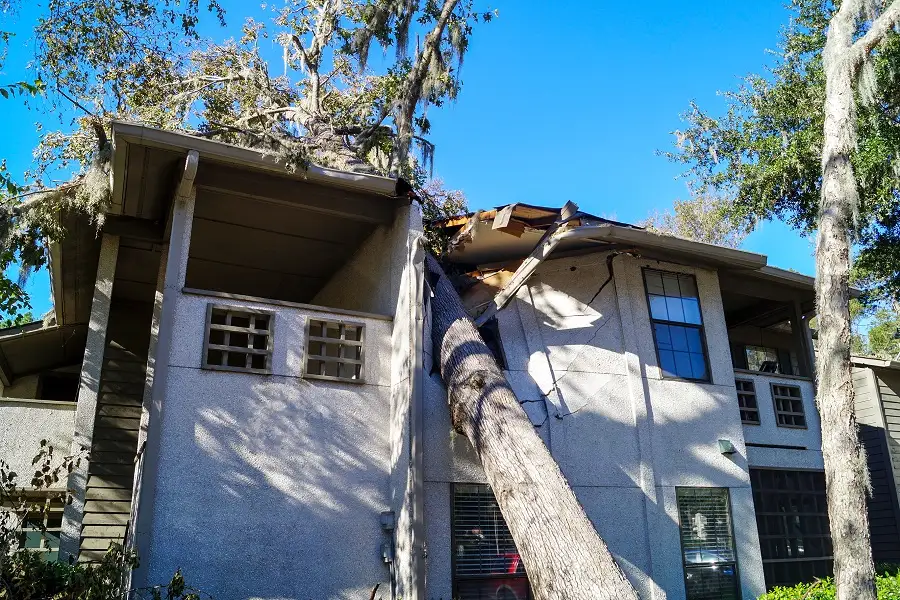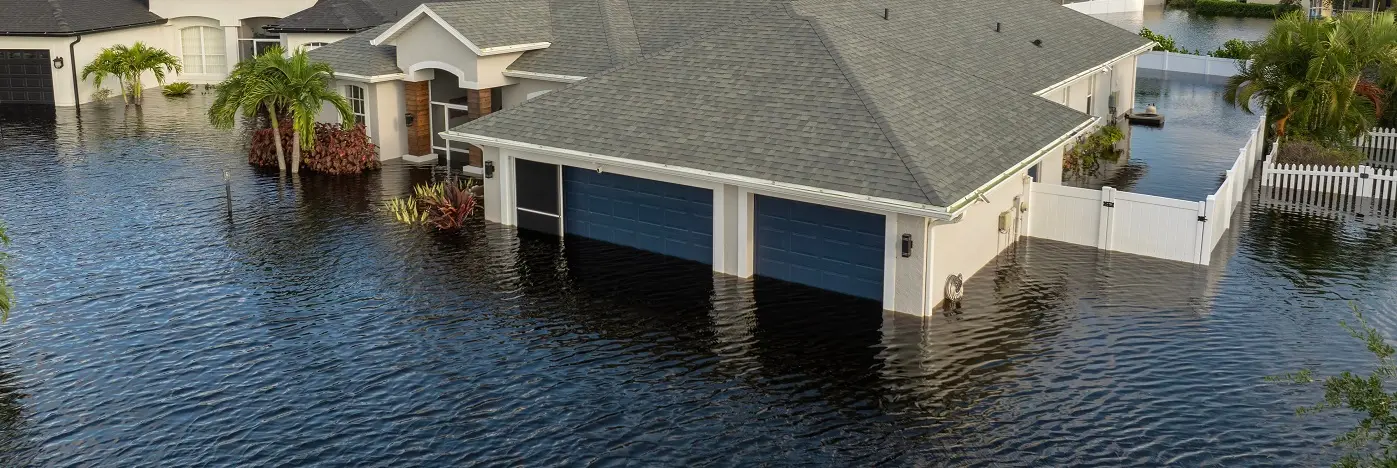When a hurricane or flood tears through your home, the devastation feels overwhelming — walls soaked, belongings ruined, memories washed away. But what makes the loss even harder to bear is the shock that comes afterward: your insurance company, the one you’ve trusted and paid faithfully for years, suddenly refuses to cover the damage.
You did everything right. You kept up with your premiums. You expected protection in your greatest time of need. Instead, you’re left fighting for what’s rightfully yours. Confusion between flood insurance and hurricane insurance can be dangerously confusing to homeowners.
In this blog post, our experienced insurance attorneys will explain these critical differences and clarify what each policy covers.

What Is Flood Insurance?
Flood insurance is a specialized insurance policy that protects your property against damage caused by flooding. This coverage is particularly crucial because standard homeowner's insurance policies typically exclude flood damage from their coverage.
What It Covers
A flood insurance policy provides coverage for damage caused by the overflow of inland or tidal waters, unusual and rapid accumulation of surface waters, or mudslides caused by flooding. The National Flood Insurance Program (NFIP) defines flooding as a general and temporary condition where two or more acres of normally dry land are submerged, or when two or more properties are affected by rising waters.
Flood coverage typically includes:
- Structural damage to your home's foundation, walls, and built-in appliances
- Damage to electrical and plumbing systems
- Debris removal
- Floor surfaces like hardwood, carpeting, and tile
- Personal property coverage (if purchased separately)
The insurance provider will assess the sustained damage and provide compensation based on the replacement cost coverage or actual cash value, depending on your specific flood insurance policy terms.
What It DOESN'T Cover
Flood insurance has several important limitations that many homeowners discover too late:
- Damage caused by sewer backup (unless directly caused by flooding)
- Living expenses while your home is being repaired
- Swimming pools, fences, decks, and patios
- Landscaping and septic systems
- Financial losses due to business interruption
- Vehicles
- Personal property stored in basements (in most cases)
Key Details
One critical aspect many homeowners overlook is that flood insurance typically has a 30-day waiting period before coverage takes effect. This means you cannot purchase a policy when a storm is already approaching and expect immediate protection.
Additionally, flood insurance and homeowner's insurance have separate deductibles, so you'll pay multiple deductibles if both types of damage occur during the same event.
What Is Hurricane Insurance?
Hurricane insurance isn't actually a separate type of insurance policy. Instead, it refers to the combination of coverages within your homeowner's insurance policy that protect against hurricane-related damage, primarily wind damage and other perils covered under standard homeowner's insurance.
What It Covers
Hurricane coverage through your homeowner's insurance policy typically covers:
- Wind damage to your roof, siding, and windows
- Damage from flying debris during tropical storms
- Hail damage
- Damage from falling trees due to hurricane winds
- Additional living expenses if your home becomes uninhabitable
- Personal property damaged by covered perils
Your insurance provider will evaluate the damage caused by wind and other covered perils, then provide compensation according to your policy's replacement cost coverage terms.
What It DOESN'T Cover
The most significant limitation of hurricane coverage through homeowners' insurance is that it does not cover flood damage. This includes:
- Water damage from storm surge
- Damage from heavy rainfall that causes flooding
- Water damage that enters through storm-damaged roofs or windows (in many cases)
- Sewer backup caused by heavy rainfall
- Damage to property below ground level due to water intrusion
Key Details
Hurricane deductibles often work differently from standard homeowners' insurance deductibles. Instead of a flat dollar amount, hurricane deductibles are frequently calculated as a percentage of your home's insured value, typically ranging from 1% to 10%.
This means that if your home is insured for $300,000 and you have a 5% hurricane deductible, you'll pay $15,000 out of pocket before your insurance coverage kicks in for hurricane-related damage.
Flood Insurance vs. Hurricane Insurance: How They Differ?

Understanding flood and hurricane insurance requires recognizing that these policies address different types of damage from the same storm event. A single hurricane can cause both wind damage (covered by homeowner's insurance) and flood damage (requiring separate flood insurance).
The key differences include:
- Source of Damage: Hurricane insurance covers wind-related damage, while flood insurance covers water damage from rising waters, storm surge, and severe flooding.
- Policy Structure: Hurricane coverage is typically part of your homeowner's insurance policy, while flood insurance requires a separate policy from the National Flood Insurance Program or private insurers.
- Deductibles: You may face both hurricane deductibles and flood deductibles for damage from the same storm, potentially creating significant out-of-pocket expenses.
- Waiting Periods: While homeowners' insurance generally takes effect immediately, flood insurance usually requires a 30-day waiting period.
- Risk Assessment: Insurance companies evaluate hurricane risk and flood risk separately, meaning your premiums for each type of coverage depend on different factors related to your property's location and vulnerability.
Why You Likely Need Both in Texas
Texas homeowners face unique risks during hurricane season that make both types of insurance coverage essential. The state's extensive coastline and low-lying areas create conditions where a single storm can cause both significant wind damage and catastrophic flooding.
Many homeowners in Texas have learned this lesson the hard way. During recent hurricanes, properties sustained damage from both wind and water, requiring claims under both homeowners' insurance policies and flood insurance policies. Those without flood coverage found themselves responsible for tens of thousands of dollars in flood-related repairs, while their homeowner's insurance only covered the wind damage.
The risk extends beyond coastal areas. Heavy rainfall associated with tropical storms can cause severe flooding hundreds of miles inland, affecting property owners who never considered themselves at risk. Insurance claims data shows that flood damage can occur in areas far from traditional flood zones, making flood insurance a wise investment even for inland properties.
How to Get the Right Coverage & What to Do Next
Securing adequate protection requires proactive planning and careful evaluation of your insurance needs. Here's how to ensure you have the right coverage:
- Assess Your Risk: Contact your insurance company to evaluate both your hurricane and flood risk. Consider factors like your proximity to water, elevation, and local drainage systems.
- Purchase Early: Don't wait until hurricane season to buy flood insurance. The 30-day waiting period means you need to act well in advance of any potential storms.
- Review Existing Policies: Many homeowners discover gaps in their coverage only after filing insurance claims. Review your homeowner's insurance policy to understand your hurricane deductibles and coverage limits.
- Consider Additional Coverage: Evaluate whether you need increased coverage limits, replacement cost coverage for personal property, or additional living expense coverage.
- Document Your Property: Create a detailed inventory of your property and belongings. This documentation proves invaluable when filing insurance claims after sustaining damage.
- Understand the Claims Process: Know how to file claims with both your homeowner's insurance and flood insurance providers. Different insurance companies may have different procedures and timelines.

Don't Get Caught Unprepared: Get Help with Omar Ochoa Law Firm
If you've sustained damage during a hurricane or flood and your insurance company has denied your claim, delayed payment, or offered inadequate compensation, Omar Ochoa Law Firm can help protect your rights. Our team understands the complexities of both flood insurance and homeowners' insurance policies, and we know how to hold insurance companies accountable for their contractual obligations.
We've helped numerous Texas homeowners recover fair compensation after hurricanes and floods, ensuring they receive the coverage they paid for. Contact us today to discuss your insurance claim issues and learn how we can help you get the compensation you deserve.

Omar Ochoa has been nationally recognized as one of the best young trial lawyers in the country. He's represented clients in federal and state courts and arbitrations throughout the United States and internationally. He is highly experienced in a wide range of complex litigation and has handled a variety of cases. He has recovered hundreds of millions of dollars for clients of all types — from individuals to mid-sized business owners to multi-national companies.
Table of Contents
Don't Risk Your Property and Thousands of Dollars
For dedicated and experienced legal help, you can place your trust in Omar Ochoa Law Firm.
Contact UsLorem ipsum dolor sit amet, consectetur adipiscing elit. Suspendisse varius enim in eros elementum tristique. Duis cursus, mi quis viverra ornare, eros dolor interdum nulla, ut commodo diam libero vitae erat. Aenean faucibus nibh et justo cursus id rutrum lorem imperdiet. Nunc ut sem vitae risus tristique posuere.
Contact UsTake Decisive Action for Your Case
Don't hesitate to contact Omar Ochoa Law Firm for aggressive representation focused on achieving significant results.
Heading
Lorem ipsum dolor sit amet, consectetur adipiscing elit. Suspendisse varius enim in eros elementum tristique. Duis cursus, mi quis viverra ornare, eros dolor interdum nulla, ut commodo diam libero vitae erat. Aenean faucibus nibh et justo cursus id rutrum lorem imperdiet. Nunc ut sem vitae risus tristique posuere.
Contact Us

